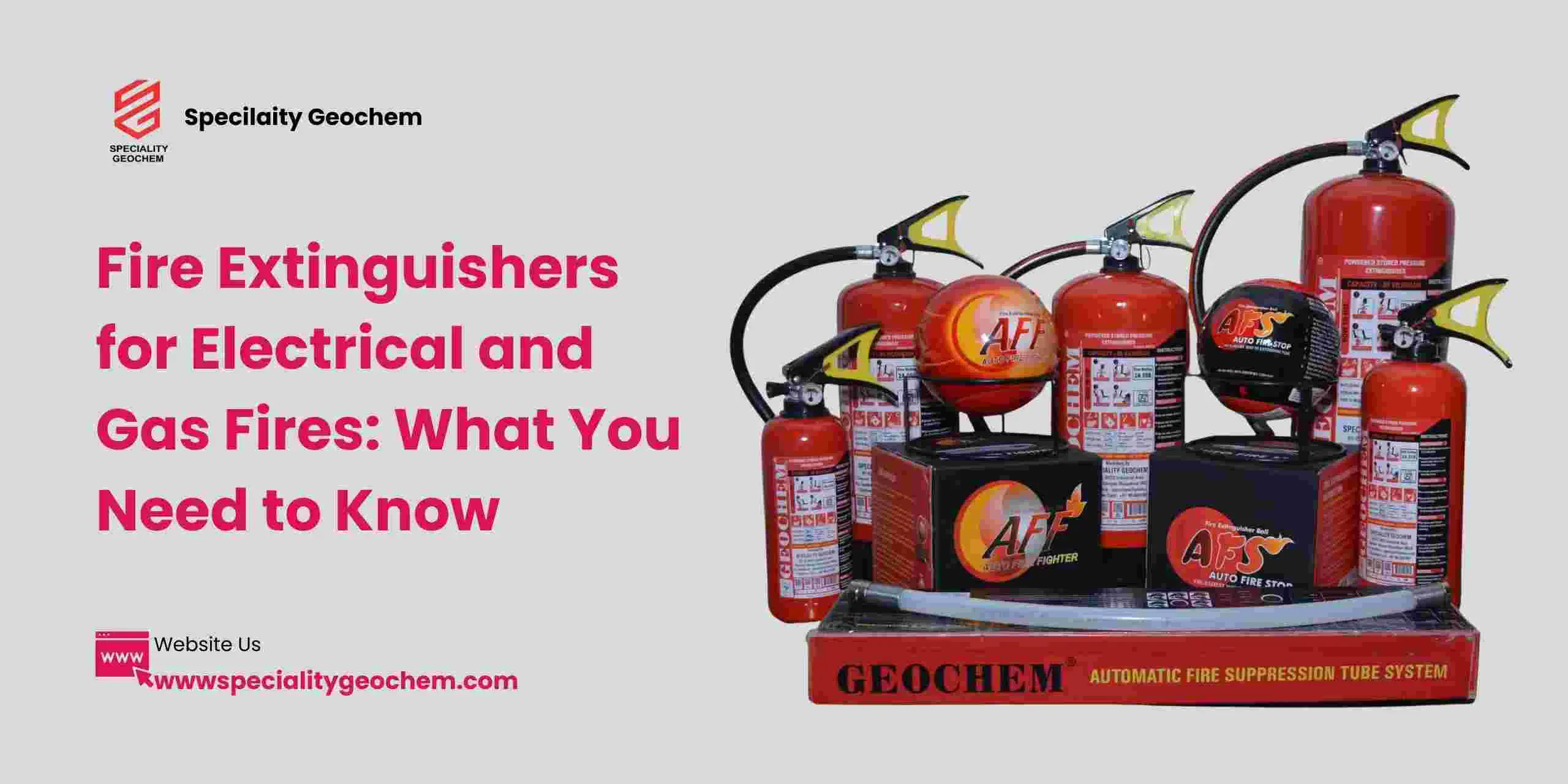When it comes to fire safety, one size does not fit all. Different types of fires require different extinguishing agents. Among the most hazardous and unpredictable types are electrical and gas fires, which demand specialized protection methods. Using the wrong extinguisher—like water-based ones—can worsen the situation, leading to electric shocks or explosions. Therefore, understanding Fire Extinguishers for Electrical and Gas Fires is essential for homes, offices, factories, and commercial establishments.
Understanding Electrical and Gas Fires
Electrical fires originate from malfunctioning wiring, overloaded circuits, or faulty appliances. These are classified as Class C fires. Gas fires, on the other hand, often arise from leaks in cooking gas cylinders, industrial pipelines, or chemical storage areas. These are categorized as Class B fires because they involve flammable gases or liquids. Both require quick and appropriate responses to prevent extensive damage.
Why Specialized Fire Extinguishers Are Important
Using the right Fire Extinguishers for Electrical and Gas Fires is not just a recommendation—it’s a life-saving necessity. Traditional water or foam extinguishers can conduct electricity or react dangerously with burning gases. Electrical fires, for example, can reignite if the power source isn’t cut, while gas fires can explode if handled incorrectly. Hence, using dry chemical, CO₂, or clean agent extinguishers is the safest approach.
Best Types of Fire Extinguishers for Electrical Fires
Electrical fires require extinguishers that do not conduct electricity. The following are the most effective options:
- CO₂ (Carbon Dioxide) Fire Extinguishers
- Ideal for Class C (electrical) fires.
- Works by displacing oxygen, cutting off the fire’s fuel source.
- Leaves no residue, making it perfect for computer rooms, data centers, and electrical panels.
- Dry Chemical Powder (DCP) Extinguishers
- Contain monoammonium phosphate or sodium bicarbonate.
- Effective on Class A, B, and C fires.
- Commonly used in offices, workshops, and residential areas with mixed fire risks.
- Clean Agent Fire Extinguishers (Halon Alternatives)
- Use non-conductive and non-corrosive gases.
- Safe for sensitive electronic equipment.
- Environmentally friendly and highly efficient.
Best Fire Extinguishers for Gas Fires
Gas fires require extinguishers that can quickly stop the burning process and prevent explosions. The most effective options are:
- ABC Dry Chemical Powder Extinguishers
- Suitable for Class B and C fires.
- Interrupt the chemical reaction in the fire triangle (fuel, oxygen, heat).
- Commonly used in industrial kitchens, gas stations, and factories.
- Foam Fire Extinguishers (AFFF)
- Can control fires caused by flammable gases or liquids like LPG or petrol.
- Forms a thick blanket that suffocates the fire and prevents re-ignition.
- Not recommended for electrical fires unless they are rated for multiple classes.
- CO₂ Extinguishers
- Highly useful for gas fires in confined spaces.
- Eliminate oxygen supply, quickly reducing the fire’s intensity.
Choosing the Right Extinguisher for Your Premises
Before buying Fire Extinguishers for Electrical and Gas Fires, evaluate the environment and potential hazards:
- Homes: Opt for a 2–5 kg DCP or CO₂ extinguisher near kitchens and fuse boxes.
- Offices: Install clean agent or CO₂ extinguishers near server rooms, switchboards, and electrical equipment.
- Industries: Use large-capacity DCP or AFFF extinguishers near gas storage areas and machinery.
- Vehicles: Compact DCP extinguishers are ideal for cars, trucks, and transport vehicles carrying LPG or CNG.
Installation and Maintenance
Proper installation and maintenance are critical for ensuring effectiveness.
- Placement:
- Install extinguishers near exits, electrical panels, and kitchens.
- Avoid placing them near heat sources or in obstructed corners.
- Inspection:
- Check pressure gauges monthly.
- Ensure safety seals and pins are intact.
- Refill or replace extinguishers every 1–3 years depending on usage and manufacturer guidelines.
- Training:
- Train employees and family members on how to use extinguishers.
- Conduct mock drills twice a year for emergency readiness.
How to Use Fire Extinguishers for Electrical and Gas Fires
Follow the PASS technique:
- P – Pull the pin.
- A – Aim the nozzle at the fire’s base.
- S – Squeeze the handle to release the agent.
- S – Sweep side to side until the fire is completely out.
For electrical fires, turn off the power source first, if safe to do so. For gas fires, shut off the gas supply immediately.
Common Mistakes to Avoid
Even with the right equipment, errors can be costly:
- Using water-based extinguishers on electrical or gas fires.
- Not cutting off power or gas supply before attempting to extinguish.
- Standing too close to the flames, risking burns or inhalation injuries.
- Neglecting maintenance or training, rendering extinguishers ineffective.
Benefits of Using the Right Fire Extinguishers
- Prevents property damage: Quick suppression stops escalation.
- Ensures safety: Non-conductive and residue-free agents protect life and equipment.
- Compliance with fire norms: Adheres to NFPA, ISI, and BIS standards.
- Long-term reliability: Quality extinguishers like those from certified brands ensure durability and confidence.
Modern Innovations in Fire Safety
Today’s Fire Extinguishers for Electrical and Gas Fires have evolved with technology. Modern models include:
- Automatic fire suppression systems that activate upon detecting high temperature.
- Smart extinguishers with sensors and alerts.
- Eco-friendly extinguishing agents that reduce carbon impact.
These innovations not only enhance protection but also simplify maintenance.
Conclusion
At Speciality Geochem, we understand that safety begins with preparedness. Our range of Fire Extinguishers for Electrical and Gas Fires is designed to deliver instant, reliable protection when it matters most. From compact CO₂ models to versatile dry chemical and clean agent types, every product reflects our commitment to quality, innovation, and trust.
By choosing Speciality Geochem, you’re not just buying equipment—you’re investing in peace of mind. Protect your home, business, and people with certified extinguishers built for Indian conditions. Stay protected. Stay proactive. Choose Speciality Geochem—your partner in fire safety.

